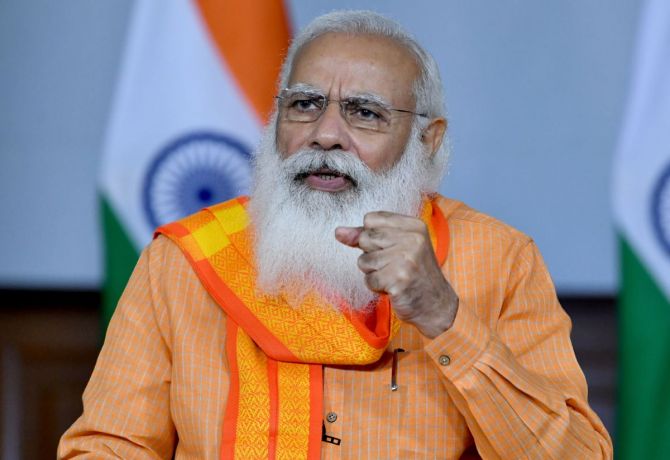It is too early to write Narendra Modi's political obituary, asserts Virendra Kapoor.

The second surge of the pandemic has raised Opposition hopes.
It seems to have persuaded itself that the Modi government has lost the goodwill of voters.
And, as and when a fresh election is held, it would be able to defeat the incumbent ruling party.
But Modi is going nowhere. Unless the Opposition wants to live in cuckoo land and is prepared to be stunned when the next general election comes around three years from now, it would consider a few basic truths about elections and voter behavior.
As we said, the next Lok Sabha poll is a good three years away.
As the saying goes, even a week is a long time in politics. The Opposition should count its chickens only when they are hatched.
Admittedly, as of this moment there is anger against the government handling of the second surge of the virus.
Woeful shortages of oxygen, life-saving medicines, hospital beds, images of bodies floating in the Ganges, et al, have dimmed Modi's popularity ratings.
Ordinary people are reeling under the biggest health crisis in the last one hundred years.
Yet, in spite of this, the PM still continues to enjoy high ratings, in any case considerably higher than any leader in the Opposition.
More than the urban literate classes, the rural poor are now hit by the new strain of the coronavirus.
But they are more likely to blame it on the 'will of god' rather than the failing of government or a political leader.
A sense of fatalism and stoicism is hardwired into the faith of simple-minded rural folk.
Whatever happens is ascribed to the will of god.
In case they still hold the government responsible for the sorry plight, what works in favour of the ruling party is both time and the ingrained tendency of our people to forgive and forget.
There is no better example than the triumphant return of the same Indira Gandhi in 1980 who was so mercilessly cast aside by voters, especially in the North and West, only three years previously.
Indira Gandhi did not have the window of three years to allow the popular anger against the excesses of the draconian Emergency to subside.
Unlike the Emergency's excesses, the virus is not man-made. Not one country in the world has acquitted itself well in controlling the pandemic without making huge mistakes.
Crucially, the shortcomings revealed following the second surge are soon to be rectified.
Production of medical oxygen and key medicines is set to multiply manifold, with oxygen capacity alone increasing ten times by year-end.
An alternative supply chain for sourcing key ingredients for vital corona drugs will soon be in place, thus reducing dependence on China for Active Pharmaceutical Ingredients.
Equally significant is the huge increase in the availability of vaccines.
From July onwards, the three domestic manufacturers will produce over a billion doses, which in case of more vaccine-makers joining in, could rise to over two billion by the end of the year.
If the state governments are able to vaccinate the rural population in large numbers not only the fear of the virus but the lingering resentment against the authorities for the initial ham-handedness in dealing with the second surge is bound to dissipate.
Over a billion vaccines can certainly ensure what the scientists call herd immunity.
Returning to the Opposition hope of voting out Modi in 2024, what is forgotten is that instead of focusing on the government's undeniable unpreparedness for the second surge, they are yet to put their own house in order.
Divisions and mutually clashing ambitions may be a bigger hurdle in challenging the Bharatiya Janata Party in the one-to-one contest in the next poll.
Unless there is unanimity on projecting a single leader as prime ministerial candidate, unless there is an acceptable and implementable agreement on fielding only one candidate against the BJP, Modi will have an upper hand.
For, in the public mind he is the only credible prime ministerial candidate as of now.
He is a great communicator, enjoys popularity across the country and is backed by a strong organizational support at the ground level.
Despite the BJP losing large number of assembly elections since the May 2019 Lok Sabha election, Modi continues to be streets ahead in popularity in the prime ministerial race against all wannabes from the Opposition.
That fact is unlikely to change in favour of the Opposition anytime soon.
Even Mamata Banerjee's recent victory in West Bengal is unlikely to catapult her as the unquestioned all-India leader of the much talked about federal front.
Indeed, not unlike the question whether the glass is half full or half empty, the truth is that if you leave aside the pre-poll hype about the BJP winning 200 seats, increasing the tally from three seats in the last assembly to 77 by no stretch of imagination constitutes a defeat.
In fact, Mamata has reason to be concerned because for the first time in her third term in power she will be up against a strong and aggressive Opposition.
In short, it is too early to write Narendra Modi's political obituary.
The BJP may not fare well in the assembly elections between now and the 2024 Lok Sabha election, but that does not alter the pole position Modi enjoys as the foremost national leader.
Anyone who has followed Modi's career will know that he can bounce back and deflate the Opposition balloon beginning to fly high in the wake of the second surge of the virus.
Caught by surprise by the sheer ferocity of the second surge, Modi is quick to learn and is now putting in place all measures to stop the further spread of the virus.
Happily for everyone, the surge too is now in retreat.
Feature Presentation: Aslam Hunani/Rediff.com











 © 2025
© 2025